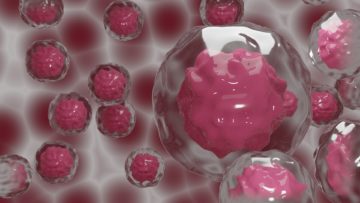From Phys.Org:
 Hypomethylating agents (HMA) are currently used as a first-line treatment for patients with myelodysplastic syndrome (MDS), and increasingly in other diseases, but their mechanism of action is not clear. HMAs may affect many genes and could potentially activate an oncogene—a gene that contributes to the development of cancer—but this has not been clearly demonstrated to date. To test this, investigators from Brigham and Women’s Hospital, Harvard Stem Cell Institute and collaborators studied how HMA affects known oncogenes. They found that HMA activated the oncofetal protein SALL4 in up to 40 percent of patients with MDS, leading to poor patient survival, even in patients in clinical remission. The findings may apply to other cancers and diseases in which HMA are being used.
Hypomethylating agents (HMA) are currently used as a first-line treatment for patients with myelodysplastic syndrome (MDS), and increasingly in other diseases, but their mechanism of action is not clear. HMAs may affect many genes and could potentially activate an oncogene—a gene that contributes to the development of cancer—but this has not been clearly demonstrated to date. To test this, investigators from Brigham and Women’s Hospital, Harvard Stem Cell Institute and collaborators studied how HMA affects known oncogenes. They found that HMA activated the oncofetal protein SALL4 in up to 40 percent of patients with MDS, leading to poor patient survival, even in patients in clinical remission. The findings may apply to other cancers and diseases in which HMA are being used.
“SALL4 is an embryonic stem (ES) cell gene and leukemic stem cell factor, and it belongs to a new class of oncofetal gene. Gain-of-function SALL4 transgenic mice develop MDS and acute myeloid leukemia (AML), as well as liver tumors. Loss-of-function studies demonstrated that SALL4 is essential for the survival of cancer cells, including leukemic cells by regulating multiple survival pathways. Our data suggest that MDS patients receiving HMA treatment should be monitored for demethylation and upregulation of oncogenes such as SALL4, which we found are linked to poor outcomes, and these patients should be provided with an additional combination therapy,” said lead author Li Chai, MD, of the Brigham’s Department of Pathology.
More here. (Note: I, along with the entire Oncology community, have been prescribing these FDA-approved drugs for twenty years to our unsuspecting patients.)
